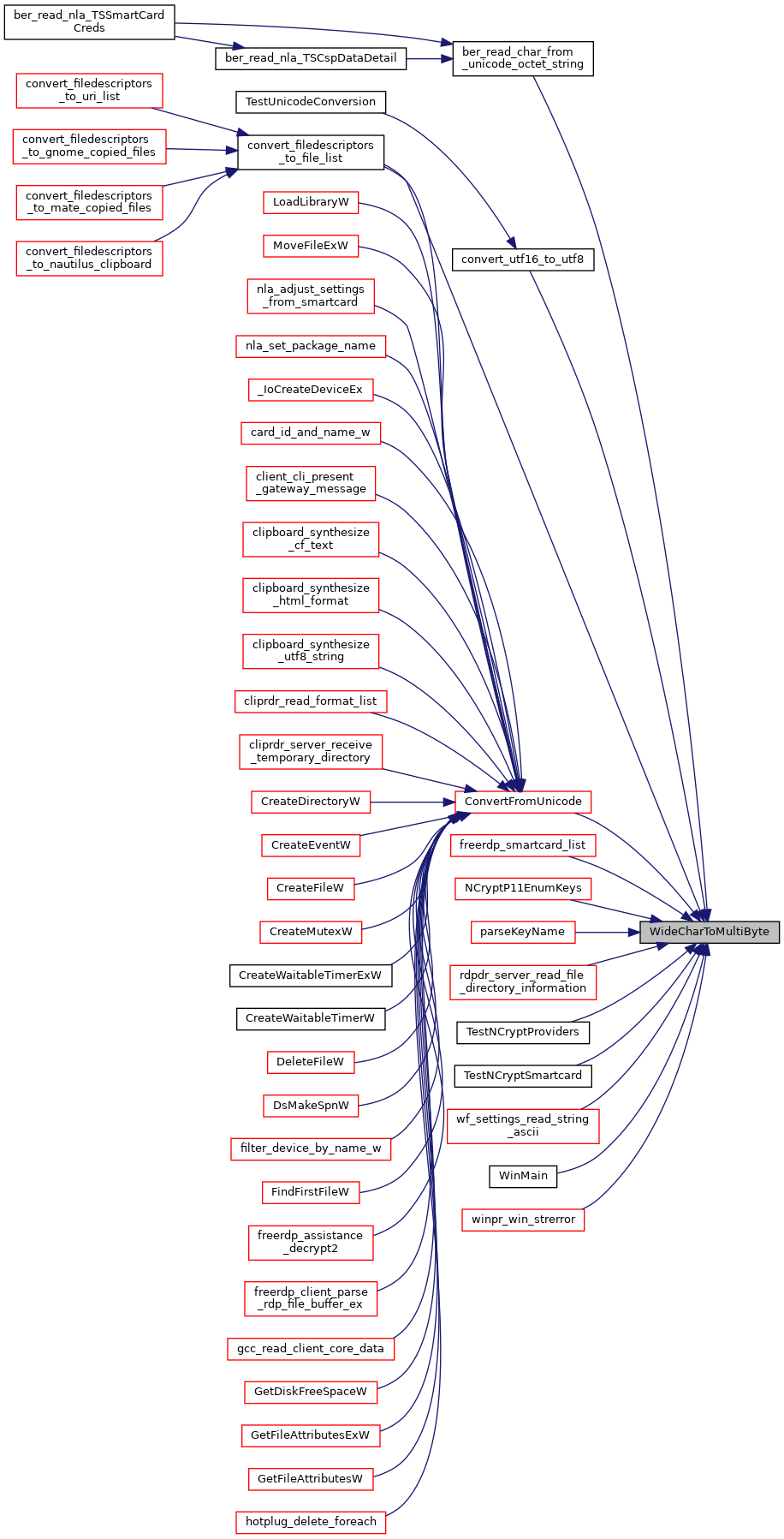Macros | |
| #define | CSTR_LESS_THAN 1 |
| #define | CSTR_EQUAL 2 |
| #define | CSTR_GREATER_THAN 3 |
| #define | CP_ACP 0 |
| #define | CP_OEMCP 1 |
| #define | CP_MACCP 2 |
| #define | CP_THREAD_ACP 3 |
| #define | CP_SYMBOL 42 |
| #define | CP_UTF7 65000 |
| #define | CP_UTF8 65001 |
| #define | MB_PRECOMPOSED 0x00000001 |
| #define | MB_COMPOSITE 0x00000002 |
| #define | MB_USEGLYPHCHARS 0x00000004 |
| #define | MB_ERR_INVALID_CHARS 0x00000008 |
| #define | CharUpper CharUpperA |
| #define | CharUpperBuff CharUpperBuffA |
| #define | CharLower CharLowerA |
| #define | CharLowerBuff CharLowerBuffA |
| #define | IsCharAlpha IsCharAlphaA |
| #define | IsCharAlphaNumeric IsCharAlphaNumericA |
| #define | IsCharUpper IsCharUpperA |
| #define | IsCharLower IsCharLowerA |
| #define | lstrlen lstrlenA |
| #define | lstrcmp lstrcmpA |
| #define | sprintf_s snprintf |
| #define | _snprintf snprintf |
| #define | _scprintf(...) snprintf(NULL, 0, __VA_ARGS__) |
| #define | _scprintf(...) snprintf(NULL, 0, __VA_ARGS__) |
Functions | |
| WINPR_API char * | _strdup (const char *strSource) |
| WINPR_API WCHAR * | _wcsdup (const WCHAR *strSource) |
| WINPR_API int | _stricmp (const char *string1, const char *string2) |
| WINPR_API int | _strnicmp (const char *string1, const char *string2, size_t count) |
| WINPR_API int | _wcscmp (const WCHAR *string1, const WCHAR *string2) |
| WINPR_API size_t | _wcslen (const WCHAR *str) |
| WINPR_API size_t | _wcsnlen (const WCHAR *str, size_t maxNumberOfElements) |
| WINPR_API WCHAR * | _wcschr (const WCHAR *str, WCHAR c) |
| WINPR_API WCHAR * | _wcsrchr (const WCHAR *str, WCHAR c) |
| WINPR_API char * | strtok_s (char *strToken, const char *strDelimit, char **context) |
| WINPR_API WCHAR * | wcstok_s (WCHAR *strToken, const WCHAR *strDelimit, WCHAR **context) |
| WINPR_API LPSTR | CharUpperA (LPSTR lpsz) |
| WINPR_API LPWSTR | CharUpperW (LPWSTR lpsz) |
| WINPR_API DWORD | CharUpperBuffA (LPSTR lpsz, DWORD cchLength) |
| WINPR_API DWORD | CharUpperBuffW (LPWSTR lpsz, DWORD cchLength) |
| WINPR_API LPSTR | CharLowerA (LPSTR lpsz) |
| WINPR_API LPWSTR | CharLowerW (LPWSTR lpsz) |
| WINPR_API DWORD | CharLowerBuffA (LPSTR lpsz, DWORD cchLength) |
| WINPR_API DWORD | CharLowerBuffW (LPWSTR lpsz, DWORD cchLength) |
| WINPR_API BOOL | IsCharAlphaA (CHAR ch) |
| WINPR_API BOOL | IsCharAlphaW (WCHAR ch) |
| WINPR_API BOOL | IsCharAlphaNumericA (CHAR ch) |
| WINPR_API BOOL | IsCharAlphaNumericW (WCHAR ch) |
| WINPR_API BOOL | IsCharUpperA (CHAR ch) |
| WINPR_API BOOL | IsCharUpperW (WCHAR ch) |
| WINPR_API BOOL | IsCharLowerA (CHAR ch) |
| WINPR_API BOOL | IsCharLowerW (WCHAR ch) |
| WINPR_API int | lstrlenA (LPCSTR lpString) |
| WINPR_API int | lstrlenW (LPCWSTR lpString) |
| WINPR_API int | lstrcmpA (LPCSTR lpString1, LPCSTR lpString2) |
| WINPR_API int | lstrcmpW (LPCWSTR lpString1, LPCWSTR lpString2) |
| WINPR_API int | MultiByteToWideChar (UINT CodePage, DWORD dwFlags, LPCSTR lpMultiByteStr, int cbMultiByte, LPWSTR lpWideCharStr, int cchWideChar) |
| WINPR_API int | WideCharToMultiByte (UINT CodePage, DWORD dwFlags, LPCWSTR lpWideCharStr, int cchWideChar, LPSTR lpMultiByteStr, int cbMultiByte, LPCSTR lpDefaultChar, LPBOOL lpUsedDefaultChar) |
| WINPR_API int | ConvertToUnicode (UINT CodePage, DWORD dwFlags, LPCSTR lpMultiByteStr, int cbMultiByte, LPWSTR *lpWideCharStr, int cchWideChar) |
| WINPR_API int | ConvertFromUnicode (UINT CodePage, DWORD dwFlags, LPCWSTR lpWideCharStr, int cchWideChar, LPSTR *lpMultiByteStr, int cbMultiByte, LPCSTR lpDefaultChar, LPBOOL lpUsedDefaultChar) |
| WINPR_API void | ByteSwapUnicode (WCHAR *wstr, int length) |
| WINPR_API int | ConvertLineEndingToLF (char *str, int size) |
| WINPR_API char * | ConvertLineEndingToCRLF (const char *str, int *size) |
| WINPR_API char * | StrSep (char **stringp, const char *delim) |
| WINPR_API INT64 | GetLine (char **lineptr, size_t *size, FILE *stream) |
Macro Definition Documentation
◆ _scprintf [1/2]
| #define _scprintf | ( | ... | ) | snprintf(NULL, 0, __VA_ARGS__) |
◆ _scprintf [2/2]
| #define _scprintf | ( | ... | ) | snprintf(NULL, 0, __VA_ARGS__) |
◆ _snprintf
| #define _snprintf snprintf |
◆ CharLower
| #define CharLower CharLowerA |
◆ CharLowerBuff
| #define CharLowerBuff CharLowerBuffA |
◆ CharUpper
| #define CharUpper CharUpperA |
◆ CharUpperBuff
| #define CharUpperBuff CharUpperBuffA |
◆ CP_ACP
| #define CP_ACP 0 |
◆ CP_MACCP
| #define CP_MACCP 2 |
◆ CP_OEMCP
| #define CP_OEMCP 1 |
◆ CP_SYMBOL
| #define CP_SYMBOL 42 |
◆ CP_THREAD_ACP
| #define CP_THREAD_ACP 3 |
◆ CP_UTF7
| #define CP_UTF7 65000 |
◆ CP_UTF8
| #define CP_UTF8 65001 |
◆ CSTR_EQUAL
| #define CSTR_EQUAL 2 |
◆ CSTR_GREATER_THAN
| #define CSTR_GREATER_THAN 3 |
◆ CSTR_LESS_THAN
| #define CSTR_LESS_THAN 1 |
WinPR: Windows Portable Runtime String Manipulation (CRT)
Copyright 2012 Marc-Andre Moreau marcandre.moreau@gmail.com Copyright 2016 David PHAM-VAN d.phamvan@inuvika.com
Licensed under the Apache License, Version 2.0 (the "License"); you may not use this file except in compliance with the License. You may obtain a copy of the License at
http://www.apache.org/licenses/LICENSE-2.0
Unless required by applicable law or agreed to in writing, software distributed under the License is distributed on an "AS IS" BASIS, WITHOUT WARRANTIES OR CONDITIONS OF ANY KIND, either express or implied. See the License for the specific language governing permissions and limitations under the License.
◆ IsCharAlpha
| #define IsCharAlpha IsCharAlphaA |
◆ IsCharAlphaNumeric
| #define IsCharAlphaNumeric IsCharAlphaNumericA |
◆ IsCharLower
| #define IsCharLower IsCharLowerA |
◆ IsCharUpper
| #define IsCharUpper IsCharUpperA |
◆ lstrcmp
| #define lstrcmp lstrcmpA |
◆ lstrlen
| #define lstrlen lstrlenA |
◆ MB_COMPOSITE
| #define MB_COMPOSITE 0x00000002 |
◆ MB_ERR_INVALID_CHARS
| #define MB_ERR_INVALID_CHARS 0x00000008 |
◆ MB_PRECOMPOSED
| #define MB_PRECOMPOSED 0x00000001 |
◆ MB_USEGLYPHCHARS
| #define MB_USEGLYPHCHARS 0x00000004 |
◆ sprintf_s
| #define sprintf_s snprintf |
Function Documentation
◆ _strdup()
| WINPR_API char* _strdup | ( | const char * | strSource | ) |
◆ _stricmp()
| WINPR_API int _stricmp | ( | const char * | string1, |
| const char * | string2 | ||
| ) |
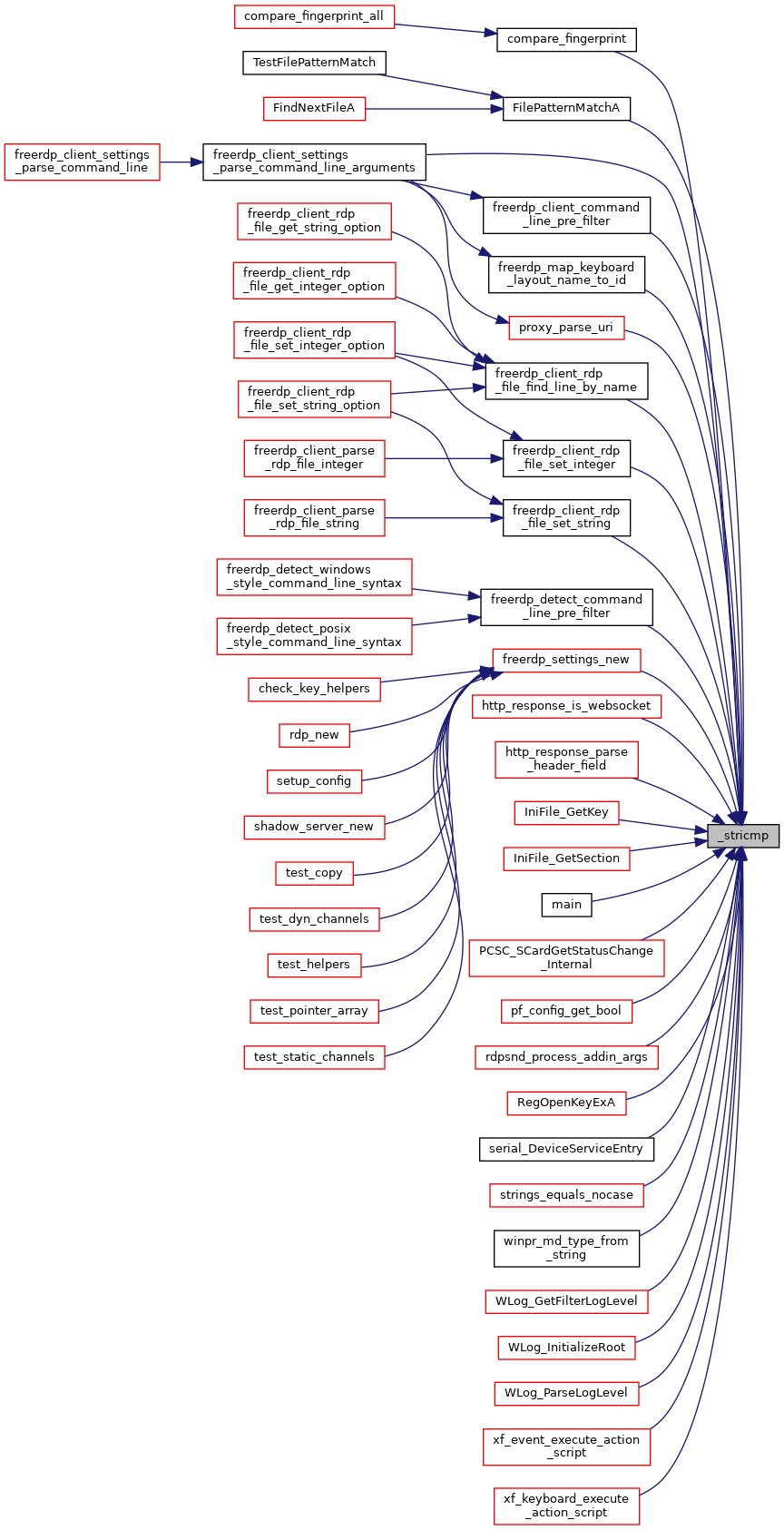
◆ _strnicmp()
| WINPR_API int _strnicmp | ( | const char * | string1, |
| const char * | string2, | ||
| size_t | count | ||
| ) |
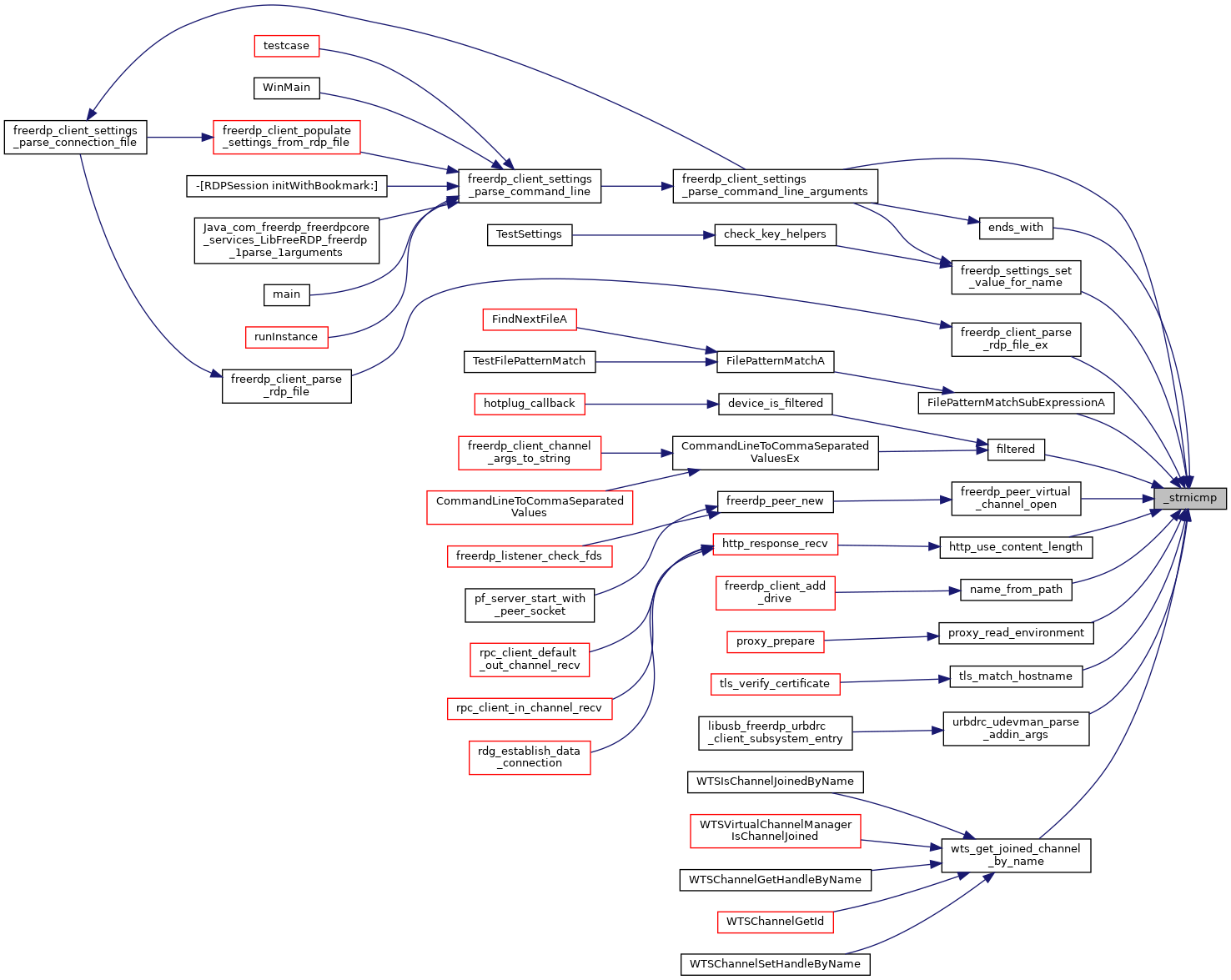
◆ _wcschr()
| WINPR_API WCHAR* _wcschr | ( | const WCHAR * | str, |
| WCHAR | c | ||
| ) |


◆ _wcscmp()
| WINPR_API int _wcscmp | ( | const WCHAR * | string1, |
| const WCHAR * | string2 | ||
| ) |
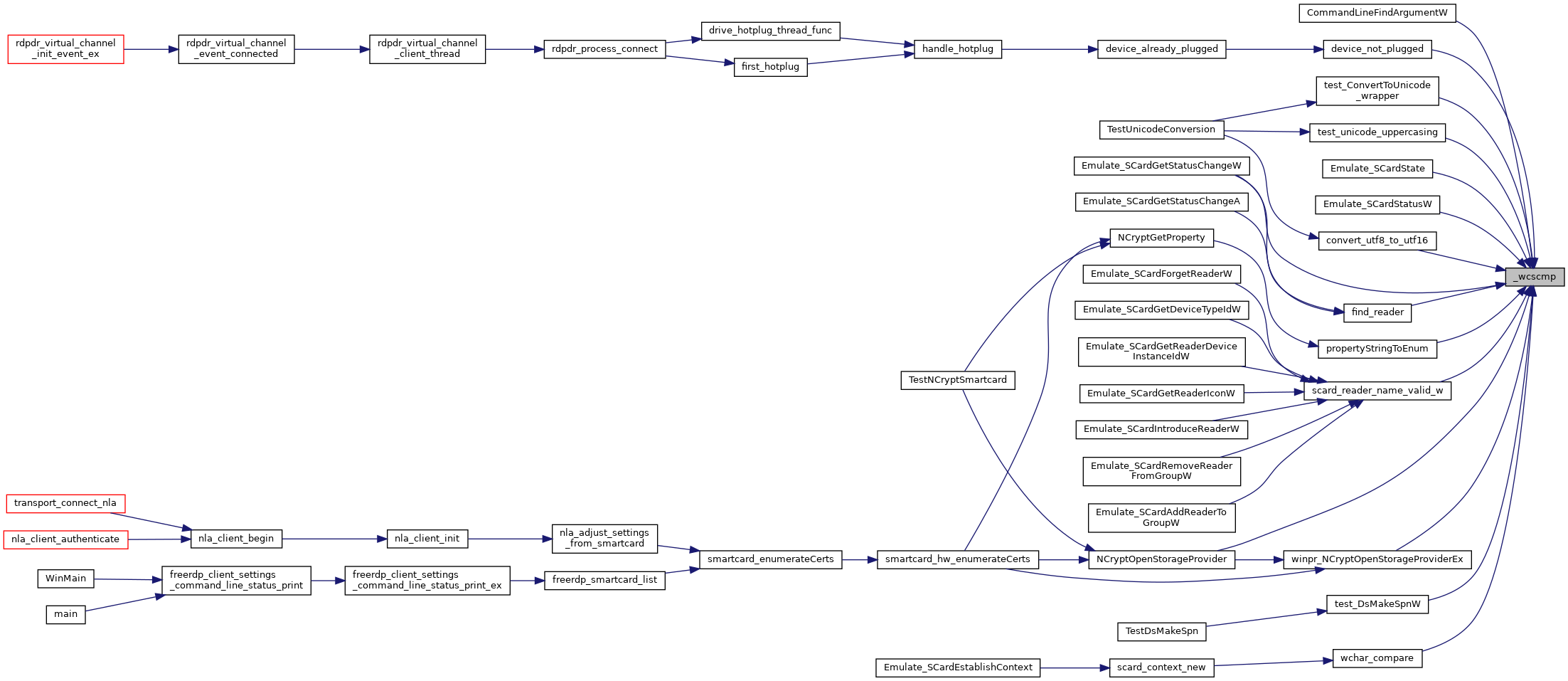
◆ _wcsdup()
| WINPR_API WCHAR* _wcsdup | ( | const WCHAR * | strSource | ) |


◆ _wcslen()
| WINPR_API size_t _wcslen | ( | const WCHAR * | str | ) |
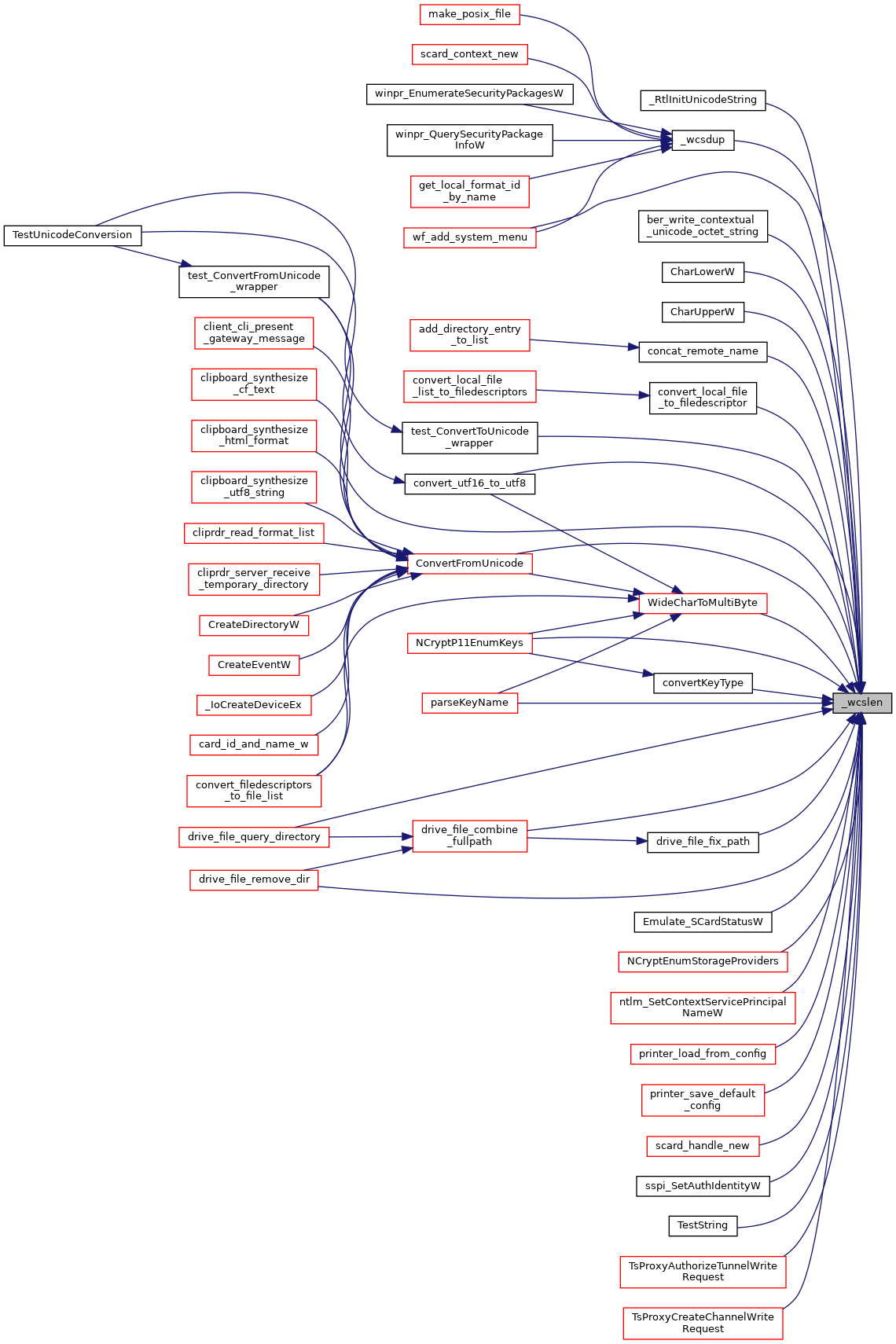
◆ _wcsnlen()
| WINPR_API size_t _wcsnlen | ( | const WCHAR * | str, |
| size_t | maxNumberOfElements | ||
| ) |
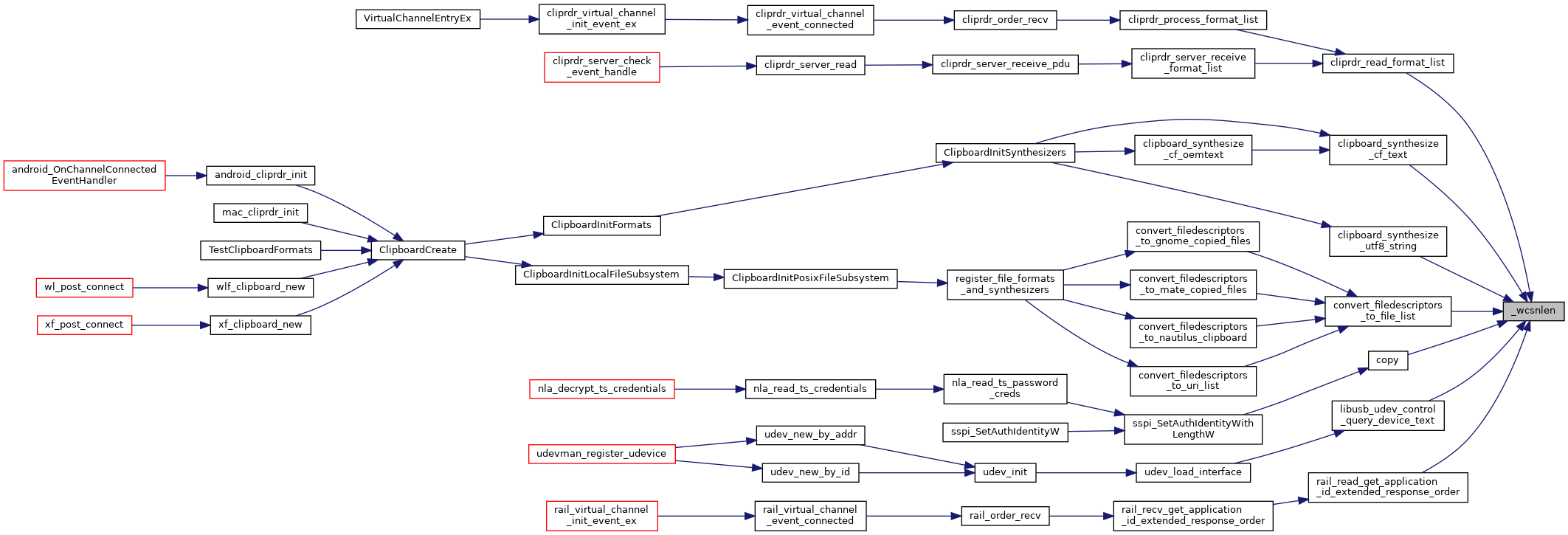
◆ _wcsrchr()
| WINPR_API WCHAR* _wcsrchr | ( | const WCHAR * | str, |
| WCHAR | c | ||
| ) |

◆ ByteSwapUnicode()
| WINPR_API void ByteSwapUnicode | ( | WCHAR * | wstr, |
| int | length | ||
| ) |
Swap Unicode byte order (UTF16LE <-> UTF16BE)


◆ CharLowerA()
| WINPR_API LPSTR CharLowerA | ( | LPSTR | lpsz | ) |
◆ CharLowerBuffA()
| WINPR_API DWORD CharLowerBuffA | ( | LPSTR | lpsz, |
| DWORD | cchLength | ||
| ) |
◆ CharLowerBuffW()
| WINPR_API DWORD CharLowerBuffW | ( | LPWSTR | lpsz, |
| DWORD | cchLength | ||
| ) |


◆ CharLowerW()
| WINPR_API LPWSTR CharLowerW | ( | LPWSTR | lpsz | ) |

◆ CharUpperA()
| WINPR_API LPSTR CharUpperA | ( | LPSTR | lpsz | ) |

◆ CharUpperBuffA()
| WINPR_API DWORD CharUpperBuffA | ( | LPSTR | lpsz, |
| DWORD | cchLength | ||
| ) |

◆ CharUpperBuffW()
| WINPR_API DWORD CharUpperBuffW | ( | LPWSTR | lpsz, |
| DWORD | cchLength | ||
| ) |


◆ CharUpperW()
| WINPR_API LPWSTR CharUpperW | ( | LPWSTR | lpsz | ) |

◆ ConvertFromUnicode()
| WINPR_API int ConvertFromUnicode | ( | UINT | CodePage, |
| DWORD | dwFlags, | ||
| LPCWSTR | lpWideCharStr, | ||
| int | cchWideChar, | ||
| LPSTR * | lpMultiByteStr, | ||
| int | cbMultiByte, | ||
| LPCSTR | lpDefaultChar, | ||
| LPBOOL | lpUsedDefaultChar | ||
| ) |
ConvertFromUnicode is a convenience wrapper for WideCharToMultiByte:
If the lpMultiByteStr parameter for the converted string points to NULL or if the cbMultiByte parameter is set to 0 this function will automatically allocate the required memory which is guaranteed to be null-terminated after the conversion, even if the source unicode string isn't.
If the cchWideChar parameter is set to -1 the passed lpWideCharStr must be null-terminated and the required length for the converted string will be calculated accordingly.

◆ ConvertLineEndingToCRLF()
| WINPR_API char* ConvertLineEndingToCRLF | ( | const char * | str, |
| int * | size | ||
| ) |

◆ ConvertLineEndingToLF()
| WINPR_API int ConvertLineEndingToLF | ( | char * | str, |
| int | size | ||
| ) |

◆ ConvertToUnicode()
| WINPR_API int ConvertToUnicode | ( | UINT | CodePage, |
| DWORD | dwFlags, | ||
| LPCSTR | lpMultiByteStr, | ||
| int | cbMultiByte, | ||
| LPWSTR * | lpWideCharStr, | ||
| int | cchWideChar | ||
| ) |
ConvertToUnicode is a convenience wrapper for MultiByteToWideChar:
If the lpWideCharStr parameter for the converted string points to NULL or if the cchWideChar parameter is set to 0 this function will automatically allocate the required memory which is guaranteed to be null-terminated after the conversion, even if the source c string isn't.
If the cbMultiByte parameter is set to -1 the passed lpMultiByteStr must be null-terminated and the required length for the converted string will be calculated accordingly.

◆ GetLine()
| WINPR_API INT64 GetLine | ( | char ** | lineptr, |
| size_t * | size, | ||
| FILE * | stream | ||
| ) |

◆ IsCharAlphaA()
| WINPR_API BOOL IsCharAlphaA | ( | CHAR | ch | ) |
◆ IsCharAlphaNumericA()
| WINPR_API BOOL IsCharAlphaNumericA | ( | CHAR | ch | ) |
◆ IsCharAlphaNumericW()
| WINPR_API BOOL IsCharAlphaNumericW | ( | WCHAR | ch | ) |
◆ IsCharAlphaW()
| WINPR_API BOOL IsCharAlphaW | ( | WCHAR | ch | ) |

◆ IsCharLowerA()
| WINPR_API BOOL IsCharLowerA | ( | CHAR | ch | ) |
◆ IsCharLowerW()
| WINPR_API BOOL IsCharLowerW | ( | WCHAR | ch | ) |
◆ IsCharUpperA()
| WINPR_API BOOL IsCharUpperA | ( | CHAR | ch | ) |
◆ IsCharUpperW()
| WINPR_API BOOL IsCharUpperW | ( | WCHAR | ch | ) |
◆ lstrcmpA()
| WINPR_API int lstrcmpA | ( | LPCSTR | lpString1, |
| LPCSTR | lpString2 | ||
| ) |
◆ lstrcmpW()
| WINPR_API int lstrcmpW | ( | LPCWSTR | lpString1, |
| LPCWSTR | lpString2 | ||
| ) |
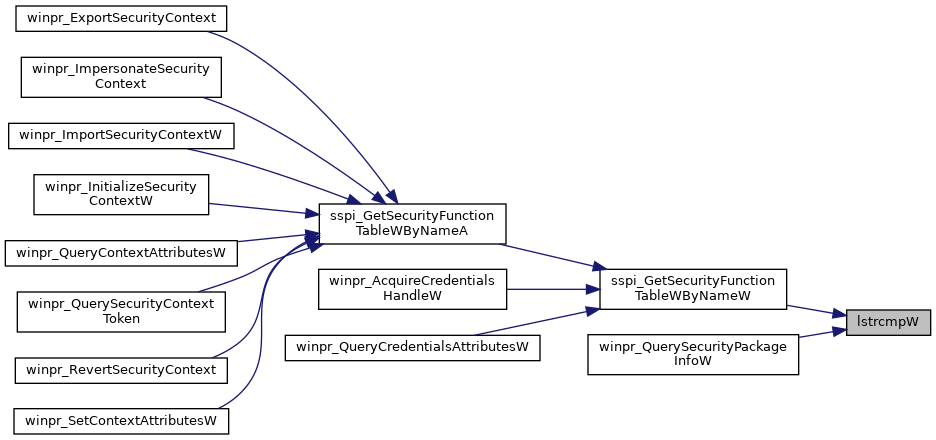
◆ lstrlenA()
| WINPR_API int lstrlenA | ( | LPCSTR | lpString | ) |
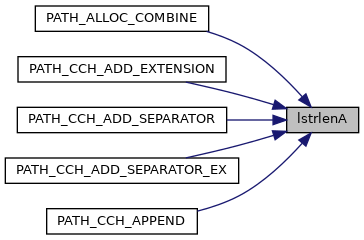
◆ lstrlenW()
| WINPR_API int lstrlenW | ( | LPCWSTR | lpString | ) |

◆ MultiByteToWideChar()
| WINPR_API int MultiByteToWideChar | ( | UINT | CodePage, |
| DWORD | dwFlags, | ||
| LPCSTR | lpMultiByteStr, | ||
| int | cbMultiByte, | ||
| LPWSTR | lpWideCharStr, | ||
| int | cchWideChar | ||
| ) |
Notes on cross-platform Unicode portability:
Unicode has many possible Unicode Transformation Format (UTF) encodings, where some of the most commonly used are UTF-8, UTF-16 and sometimes UTF-32.
The number in the UTF encoding name (8, 16, 32) refers to the number of bits per code unit. A code unit is the minimal bit combination that can represent a unit of encoded text in the given encoding. For instance, UTF-8 encodes the English alphabet using 8 bits (or one byte) each, just like in ASCII.
However, the total number of code points (values in the Unicode codespace) only fits completely within 32 bits. This means that for UTF-8 and UTF-16, more than one code unit may be required to fully encode a specific value. UTF-8 and UTF-16 are variable-width encodings, while UTF-32 is fixed-width.
UTF-8 has the advantage of being backwards compatible with ASCII, and is one of the most commonly used Unicode encoding.
UTF-16 is used everywhere in the Windows API. The strategy employed by Microsoft to provide backwards compatibility in their API was to create an ANSI and a Unicode version of the same function, ending with A (ANSI) and W (Wide character, or UTF-16 Unicode). In headers, the original function name is replaced by a macro that defines to either the ANSI or Unicode version based on the definition of the _UNICODE macro.
UTF-32 has the advantage of being fixed width, but wastes a lot of space for English text (4x more than UTF-8, 2x more than UTF-16).
In C, wide character strings are often defined with the wchar_t type. Many functions are provided to deal with those wide character strings, such as wcslen (strlen equivalent) or wprintf (printf equivalent).
This may lead to some confusion, since many of these functions exist on both Windows and Linux, but they are not the same!
This sample hello world is a good example:
include <wchar.h>
wchar_t hello[] = L"Hello, World!\n";
int main(int argc, char** argv) { wprintf(hello); wprintf(L"sizeof(wchar_t): %d\n", sizeof(wchar_t)); return 0; }
There is a reason why the sample prints the size of the wchar_t type: On Windows, wchar_t is two bytes (UTF-16), while on most other systems it is 4 bytes (UTF-32). This means that if you write code on Windows, use L"" to define a string which is meant to be UTF-16 and not UTF-32, you will have a little surprise when trying to port your code to Linux.
Since the Windows API uses UTF-16, not UTF-32, WinPR defines the WCHAR type to always be 2-bytes long and uses it instead of wchar_t. Do not ever use wchar_t with WinPR unless you know what you are doing.
As for L"", it is unfortunately unusable in a portable way, unless a special option is passed to GCC to define wchar_t as being two bytes. For string constants that must be UTF-16, it is a pain, but they can be defined in a portable way like this:
WCHAR hello[] = { 'H','e','l','l','o','\0' };
Such strings cannot be passed to native functions like wcslen(), which may expect a different wchar_t size. For this reason, WinPR provides _wcslen, which expects UTF-16 WCHAR strings on all platforms.

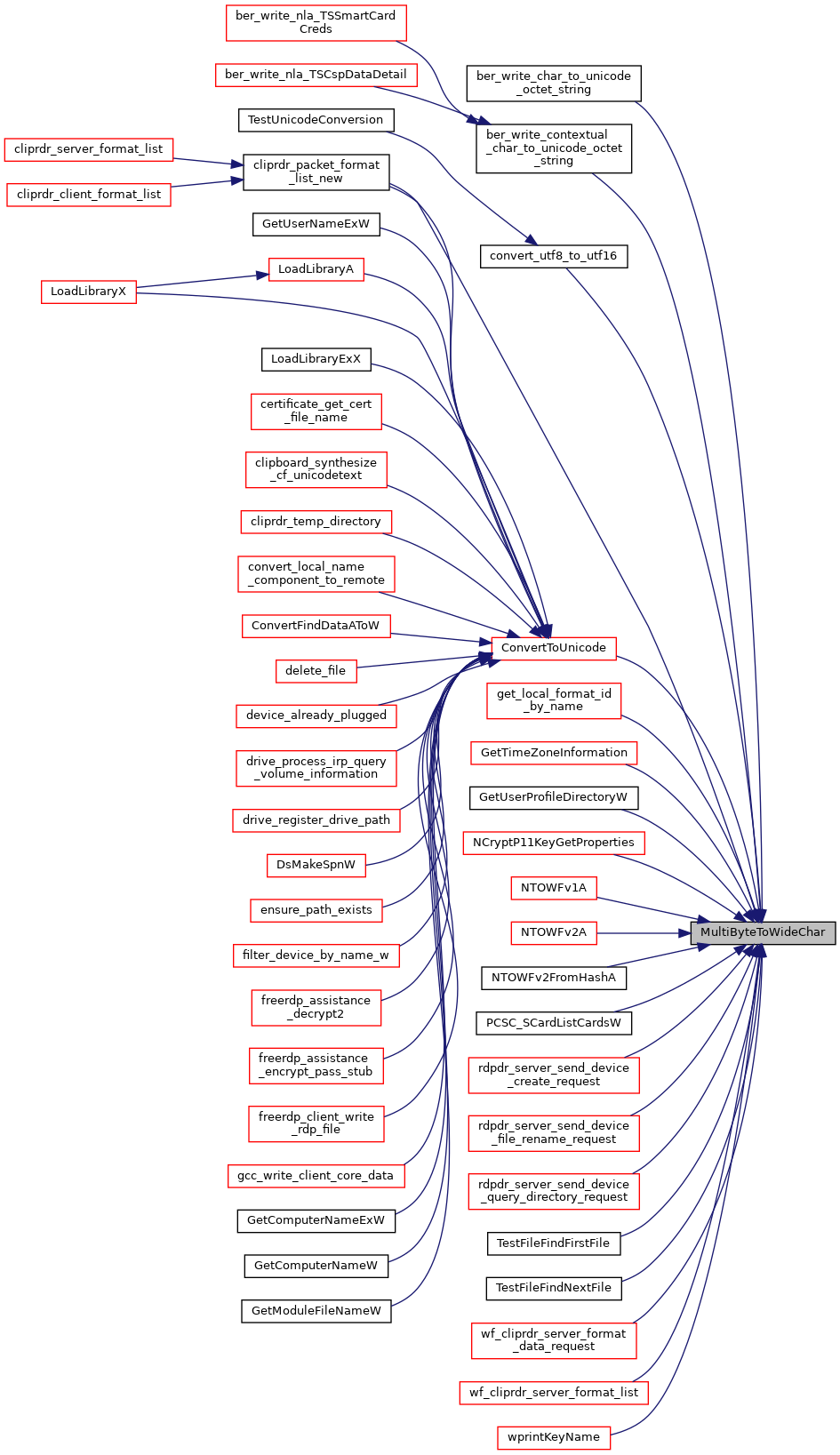
◆ StrSep()
| WINPR_API char* StrSep | ( | char ** | stringp, |
| const char * | delim | ||
| ) |

◆ strtok_s()
| WINPR_API char* strtok_s | ( | char * | strToken, |
| const char * | strDelimit, | ||
| char ** | context | ||
| ) |
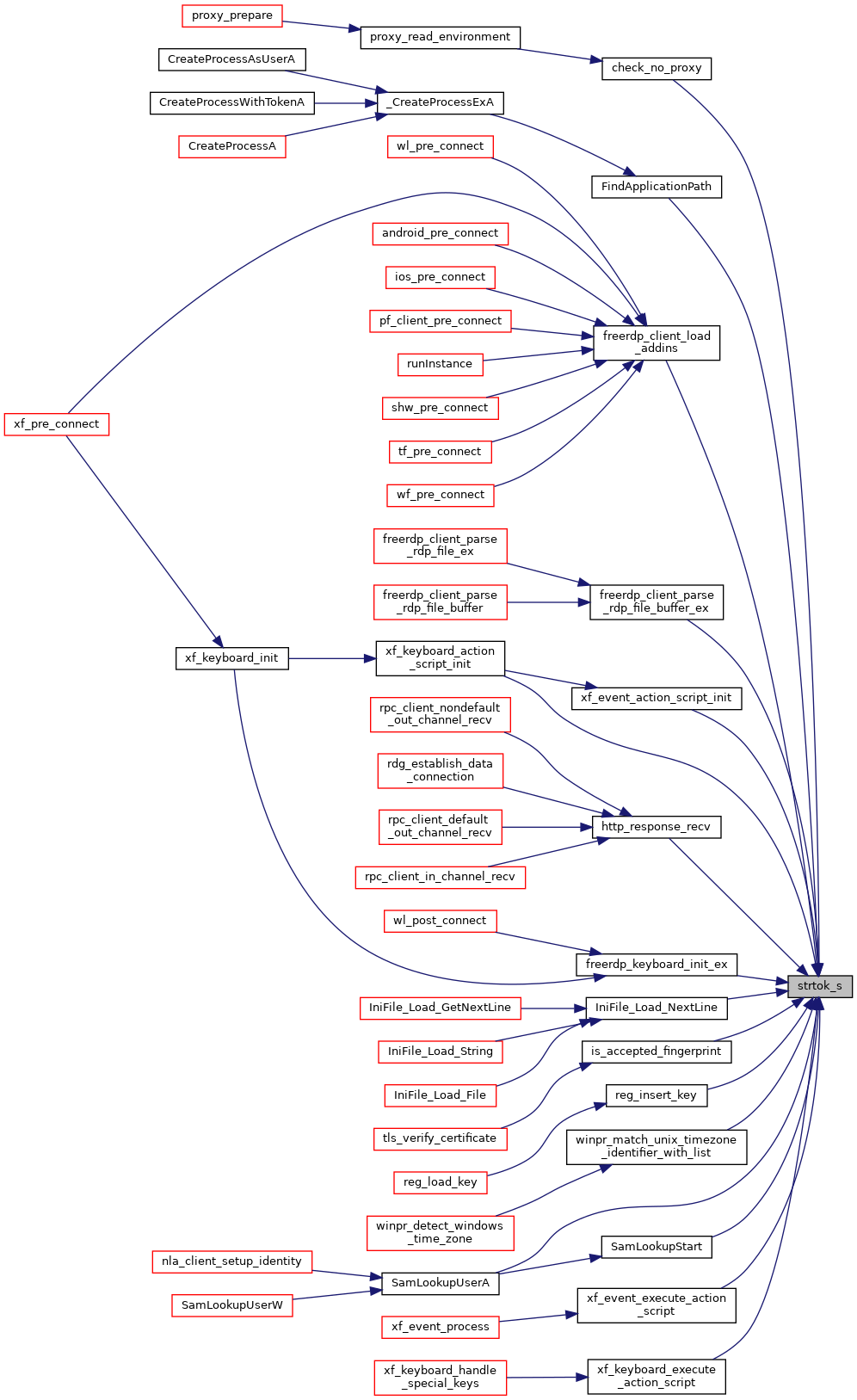
◆ wcstok_s()
| WINPR_API WCHAR* wcstok_s | ( | WCHAR * | strToken, |
| const WCHAR * | strDelimit, | ||
| WCHAR ** | context | ||
| ) |


◆ WideCharToMultiByte()
| WINPR_API int WideCharToMultiByte | ( | UINT | CodePage, |
| DWORD | dwFlags, | ||
| LPCWSTR | lpWideCharStr, | ||
| int | cchWideChar, | ||
| LPSTR | lpMultiByteStr, | ||
| int | cbMultiByte, | ||
| LPCSTR | lpDefaultChar, | ||
| LPBOOL | lpUsedDefaultChar | ||
| ) |

